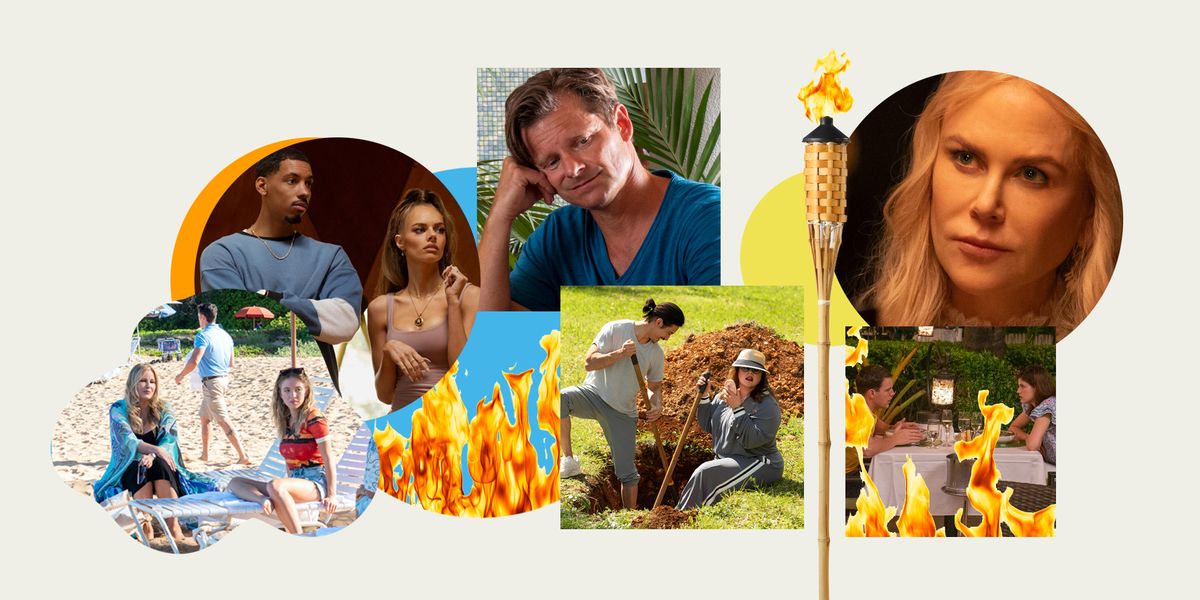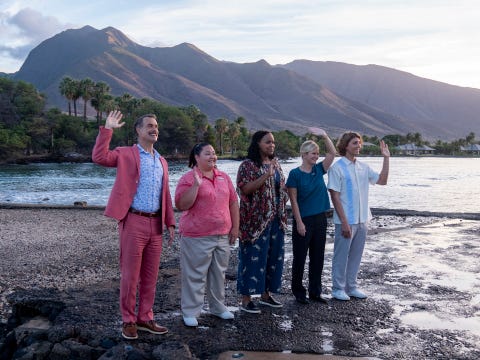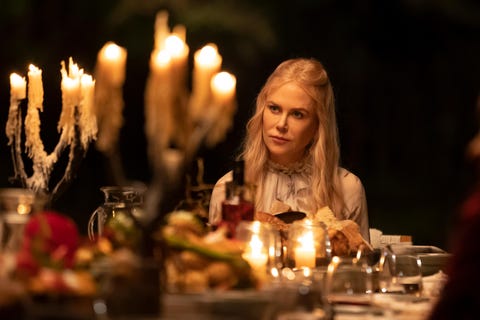Products You May Like
By now, you’d have had to be in exile on a WiFi-barren island to avoid the buzz around HBO’s surprise summer hit The White Lotus. Set at a lavish Hawaiian resort, the deliciously mischievous show portrays a group of privileged, oblivious, mostly white guests and the frustrated staff members attempting to perfect their stay. Yet nothing—not the“romantic” boat ride for the newlyweds, nor the traditional luau dinner-and-show for families—goes as planned. As the episodes peel back the layers of the seemingly picturesque oceanside vacation, some truly dark debris floats to the surface.
Shot over a course of a few months in late 2020, The White Lotus has the veneer of escapism. It promises what vacation is supposed to promise: luxury, relaxation, and a hard pivot from the bite of reality. But, instead of such fluttery feelings, The White Lotus conjures anxious chills and uncomfortable laughter. The show is hardly alone in its portrayal of vacationing as a hellish, absurd road to self-discovery. In 2021, you’ll find plenty of proof that fictionalized vacation isn’t what it used to be.
On August 18, Hulu will release Nine Perfect Strangers, its most ambitious project to date, in which Nicole Kidman’s wellness guru welcomes nine guests in various states of distress to a slick-looking self-improvement retreat; things get weird, fast.
Also on Hulu, out August 27th, is Vacation Friends, starring Yvonne Orji, John Cena, Lil Rel Howery, and Meredith Hagner, in a comedy about a “nice” couple whose wild, inappropriate Mexican getaway adventures with another pair of drug-loving, hard-partying holiday-makers— presumably left in the past and forgotten—threaten to ruin their wedding weekend.
Perhaps you could try escaping into a feel-good beach read? No luck there, either. From Emily Henry’s best-selling, bittersweet People We Meet on Vacation to the upcoming Guilt Trip, Sandie Jones’ thriller-meets-destination-wedding, the books of the summer use vacation as a set-up for conflict, emotional turmoil, self-exploration and even self-immolation. The main source of it all isn’t the locale itself, nor some foreign evil, à la The Rental. No, in this new crop of pop-culture products, trouble on vacation stems from within the vacationers themselves.
As pop culture consumers, we’ve never been more equipped for this plot twist; the pandemic has re-shaped the way we work, shop and date, so why not the way we vacation?
“During the pandemic, I thought in the beginning that it would be nice to have some downtime, but I started to have a lot of existential angst,” says White Lotus creator Mike White. “I sometimes feel like on vacations you escape some of your immediate problems, but the bigger, macro, low-frequency questions about what you’re doing with your life can start to creep in. That seemed like a ripe conceit for the show.”
It’s quite possible that during the pandemic—a long, tedious detour from normalcy—we’ve come to realize that real escapism is an exercise in futility, no matter how gorgeous the destination. “The pandemic definitely plays into [it],” White says. “We’ve all had to stop doing what we’re doing and wonder where we all are, and it does create these kinds of stressed-out feelings, similar to being anxious on vacation.” Fittingly, on The White Lotus characters are constantly grappling with reality ruining their me-time: One deals with a possible cancer diagnosis. Another re-considers her marriage of convenience. And another dives right into her deepest insecurities, while trying—unsuccessfully—to rid herself of her late mother’s ashes. All this turmoil is waved through the resort’s seductive interiors, picturesque sunsets and candlelit dinners.
On Nine Perfect Strangers, partially shot at a real-life wellness retreat in Australia, the very idea of traveling to disconnect and fix one’s life is turned on its head. Based on a 2018 book by Big Little Lies author Liane Moriarty, the show, says director Jonathan Levine, feels remarkably timely. “The retreat creates a little bit of anxiety in our characters, and that resonates even more in this world [now] than it did when Liane wrote the book,” Levine says. “It’s this concept that the perfect is unsafe, that there are no safe spaces anymore. All these new realities of the COVID world. It’s a little scary when a lack of safety begins to encroach on your leisure time.”
Even more of-the-time is the way Nine Perfect Strangers messes with the idea of travel as self-care, from “having fun with some tropes of the wellness industry,” to the fact that the arrival to the retreat is set up “like either an Agatha Christie or a horror film. There’s something sinister beneath this quest for perfection, and a little sad.”
Both White Lotus and Nine Perfect Strangers highlight how existentially difficult and problematic the notion of pampering, entitled “leisure” can be, but also how spending time with others—a prized dream we’ve all been nurturing during pandemic lockdowns—isn’t as ideal as we perhaps remembered it.
“When you travel with someone, you have a chance to see them under duress. You see them at their very worst and their very best,” says Emily Henry, the author of People We Meet on Vacation, in which a close friendship grows into love over the course of many awkward, are-we-or-aren’t-we summer trips. “Some of the best inside jokes and the stories you pull out at parties come from trips that went very badly and what you learned about yourself, and your companions, in the thick of it.”
Are we finally willing to admit that dream vacations and idyllic retreats with well-behaved nice people are overrated? “I think those stories have always been out there, but we are in a perfect moment for them as an audience,” Henry says. “Maybe it’s because the trip-from-hell narrative isn’t quite so daunting if you’re not traveling—or maybe we’re all just so desperate for that feeling of newness that even the most nightmarish travel scenarios have a little bit of appeal right now.”
Perhaps there’s something newly enticing about even a nightmarish vacation. After all, at least it’s a change of pace. These “vacation is hell” moments feel personal, impactful, transformational in some way. As borders have slowly reopened, many women, in particular, have turned to travel for a hard reset. They’ve approached vacationing with a new set of expectations. No one knows this better than Meg Jerrard, the co-founder of Solo Female Travelers, a Facebook group with over 100,000 members worldwide.
“The pandemic has lifted the veil on our prior notions that everything has to be ‘perfect,’” she says. “We’ve realized that nothing in life is perfect, not even vacations. Now, the type of vacation people crave is less of a perfect image they can share on social media to the envy of everyone left at home, and more of a transformational experience for themselves, where, even if things go wrong along the way, or the journey isn’t like the shiny image that travel brochures portray, they can rediscover themselves again.” The posts on the group, from recent months alone, would make for a riveting television plot; anything—from being stuck on a group tour with a racist misogynist to dealing with a sudden breakup while hiking and dining abroad—is fair game.
We all still want—and perhaps even need—a vacation. “We’re all masked-up and afraid of each other, and you may have taken a road trip or a staycation,” White says, “but I feel like there’s a hunger to feel like you’re really living.” And living, while being on vacation in 2021, just might look like a hot mess: doing dumb things with out-of-control fellow travelers; experiencing extreme loneliness; crying hysterically while making out; maybe even surrendering to strange self-help techniques delivered by a questionably accented Nicole Kidman. Vacation doesn’t need to be perfect; escapism is a scam. As viewers and readers, we’re ready to accept this in fiction. Maybe it’s time we accepted it in real life, too.
This content is created and maintained by a third party, and imported onto this page to help users provide their email addresses. You may be able to find more information about this and similar content at piano.io


